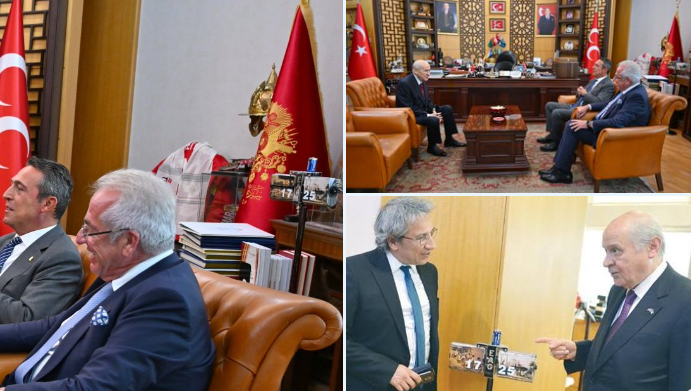Far-right Nationalist Movement Party (MHP) leader Devlet Bahçeli dismissed speculation of a rift with President Recep Tayyip Erdoğan following the reappearance of a frozen clock in his office during a meeting with Fenerbahçe President Ali Koç that revived memories of past corruption probes against the ruling Justice and Development Party (AKP).
The clock, stopped at 17:25, was first revealed in 2015 and symbolizes the corruption investigations of December 17-25, 2013, which implicated then-prime minister Erdoğan and his inner circle. The investigations were later dismissed by the government as a plot orchestrated by the Gülen movement, leading to a widespread crackdown on its followers.
The “17:25” clock, which first appeared in Bahçeli’s office during a 2015 interview with journalist Can Dündar, had been a prominent symbol until 2016, just before the formation of the alliance between the MHP and Erdoğan’s AKP. After 2016, the clock was notably absent from photos of Bahçeli’s office. However, according to a report by the Serbestiyet news website, it made a conspicuous reappearance on July 2, 2024, after being absent in a photo taken just days earlier on June 24, 2024, signaling its renewed significance in Bahçeli’s political messaging.
Bahçeli, a longtime ally of Erdoğan, claimed that the clock, prominently displayed in his office, serves as a reminder of the so-called Gülenist conspiracy. He stated that the reappearance of the clock during his meeting with Koç was not a coincidence but rather a deliberate message to remind the public of the events leading up to a coup attempt in 2016.
In a statement posted on social media, Bahçeli emphasized that the clock’s presence was not an indication of a rift within the ruling party but a symbol of the ongoing fight against those whom he claims sought to destabilize Turkey.
“The December 17-25 process was the incubation period for the July 15 FETÖ betrayal,” he wrote, referring to the Gülen movement by its government-designated, derogatory acronym. “It is not possible to forget or ignore this process.”
The Gülen movement is a worldwide civic initiative rooted in the spiritual and humanistic tradition of Islam. The bases of the movement are diverse service projects that are initiated, funded and conducted by people who are motivated by the humanitarian discourse of Fethullah Gülen, a Turkish cleric resident in the US.
Immediately after the coup attempt in 2016, which claimed the lives of 251 people, injured a thousand others and was suppressed overnight, Turkish President Erdoğan and his AKP government pinned the blame on the Gülen movement.
Gülen and the movement strongly deny involvement in the abortive putsch or any terrorist activity.
Erdoğan has been targeting followers of the Gülen movement since the corruption investigations of December 17-25, 2013.
Dismissing the investigations as a Gülenist coup and conspiracy against his government, Erdoğan designated the movement as a terrorist organization and began to target its members. He locked up thousands, including many prosecutors, judges and police officers involved in the investigation.
Bahçeli’s comments come at a time of heightened political tension in Turkey, with early elections being floated as a possibility amid economic challenges and growing public discontent. Far-right Victory Party leader Ümit Özdağ, a former MHP member, suggested that Bahçeli’s covert reference might be a sign of dissatisfaction with the current power-sharing arrangement with the ruling AKP, noting that “nothing in Bahçeli’s life is coincidental.”
However, Bahçeli strongly rejected these interpretations, reaffirming his commitment to the “People’s Alliance,” the electoral alliance between the MHP and Erdoğan’s AKP. He also warned against attempts by opposition forces to sow discord within the alliance, stating that “those who try to create cracks within the People’s Alliance will inevitably fail.”
Bahçeli’s MHP, which initially criticized the AKP over the corruption allegations, has since become one of Erdoğan’s most steadfast allies, particularly following the failed 2016 coup. The two parties have cooperated closely in recent years, particularly on issues related to national security and the suppression of the Gülen movement and Kurdish groups.
Speculation about a possible collapse of the alliance between the AKP and the far-right MHP intensified following the AKP’s poor performance in the March 31 local elections. The AKP secured only 35.4 percent of the vote nationwide, while the MHP garnered a mere 4.9 percent. This lackluster showing has fueled rumors that Erdoğan and MHP leader Bahçeli might dissolve their alliance and seek new political partnerships.
Adding to the speculation was the perceived “normalization” of relations between the AKP and opposition parties, particularly the main opposition Republican People’s Party (CHP), which did well in the local elections. Erdoğan and CHP leader Özgür Özel’s visits to each other’s party headquarters for the first time in years have led to discussions about a potential shift in Turkey’s political landscape. However, Erdoğan has dismissed these rumors, insisting that the People’s Alliance remains strong and is essential for Turkey’s unity and security.
Despite the recent speculation, both Bahçeli and Erdoğan say they are committed to maintaining their alliance, which has been crucial in securing electoral victories and consolidating power in Turkey’s political landscape.
